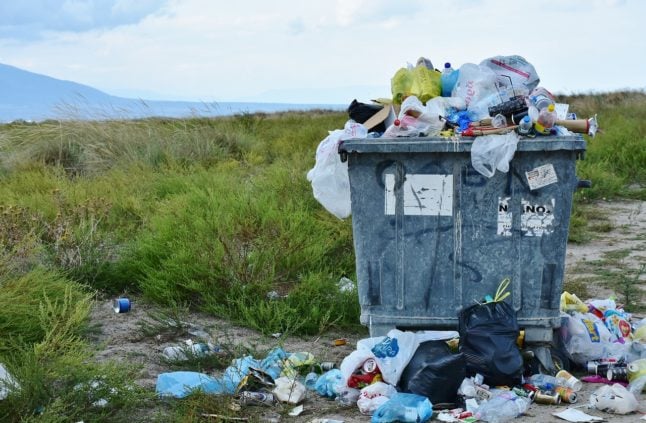You may think Switzerland’s obsession with its trash is just plain rubbish.
But the Swiss take waste management very seriously — so seriously, in fact, that every 10 years since 1982, the Federal Office for the Environment (FOEN) has foraged through massive amounts of trash collected from 33 sample communes.
However, this has very little to do with the Swiss obsession with cleanliness and everything to do with its obsession for sorting, recycling, and proper waste disposal.
No doubt part of this fixation is the fact that the Swiss population produces around 700 kg of waste per inhabitant every year — one of the highest quantities in Europe.
Yet, paradoxically, Switzerland is also among countries that recycle the most, according to EU statistics.
So why does is the government engaging in a decidedly unpleasant task of going through the waste?
While inspecting trash is not the most glamorous job, it is an important task in Switzerland, as it “provides valuable information on the consumption behaviour of the population”, according to FOEN.
It also “assesses the efficiency of the country’s waste management system”, which is just as well since Switzerland is all about efficiency — whether in terms of punctuality of its trains or trash disposal.
Isn’t going through one’s trash a violation of privacy?
Apparently not.
As a matter of fact, garbage disposal is strictly regulated in Switzerland. And if you think you can just stuff your trash anywhere, toss the bag like a football and leave it where it lands, you are very wrong.
Sorting and disposing of garbage is a painstaking process in Switzerland.
In all towns and villages, trash must be segregated and placed in special bags or in bags that have a special sticker on them, and placed in a designated collection point on assigned days.
READ MORE: Trash talk: What are the rules for garbage disposal in Switzerland?
Not segregating your trash — for instance, throwing out PET bottles with tin cans or paper, or not putting it out on correct days — can result in heavy fines, the amount of which is determined by each individual commune.
Municipal workers have the right to go through trash bags to identify garbage offenders — and they do.
The offenders then receive fines by mail, which they should not toss randomly in the trash, as they may be breaking the law again — instead, they should be recycled with other paper.
While you may be tempted to laugh this off, this is not a joke.
A number of ‘garbage criminals’ have been nabbed in Switzerland in recent years, including a man in Biel / Bienne who put a bag of rubbish out on the street on the wrong day and also failed to attach a municipal tax sticker to the bag.
Unfortunately for the man, two rubbish detectives who regularly patrol the city noticed the offending bags, opened them and examined their contents through which they were able to identify him.
He was fined 150 francs, but since he never paid it (likely throwing it in the trash), state prosecutors ruled that he had to spend two days in jail.
What ‘offending’ objects do inspectors find in the trash?
FOEN said that “many recyclable materials end up in household waste” — for instance paper and cardboard — as well as food.
By far the oddest find, however, was discovered in 2015: a (dead) body that tumbled out of a rolled-up carpet.
There is no word on how the body ended up in trash, or anything else about this incident for that matter.



 Please whitelist us to continue reading.
Please whitelist us to continue reading.
Member comments